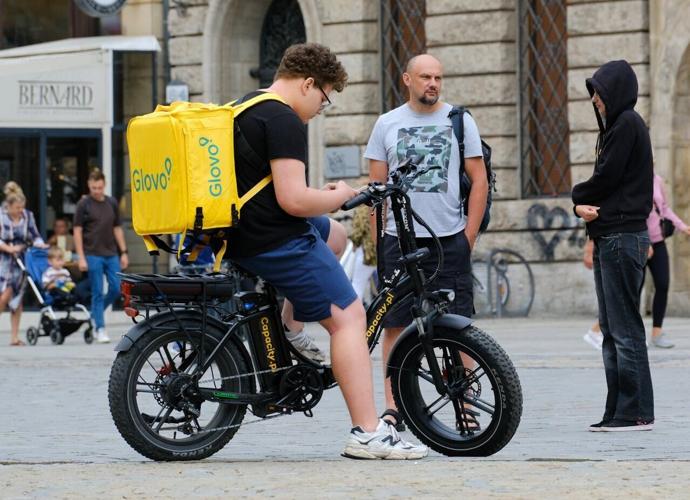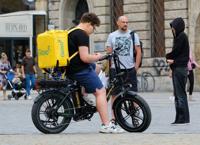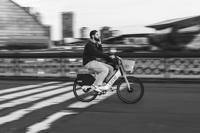
(Photo by Roman Biernacki via Pexels)
By Stephen Beech
E-bicycle riders are eight times more likely to crash in cities than the riders of electric scooters, according to new research.
E-scooters have often been identified as more dangerous than electric bikes, but safety experts say that picture changes when they are compared on equal terms.
The new study shows that the crash risk is eight times higher for e-bikes than for e-scooters, calculated based on the trip distance with rental vehicles in cities.
The Swedish research team says their "surprise" findings suggest that previous studies have "grossly underestimated" the safety of e-scooters in relation to e-bicycles.
E-scooters have become an increasingly common means of transport in cities.
A number of previous studies have identified e-scooters as far more dangerous than e-bikes and ordinary bicycles.
But according to the new study from Sweden's Chalmers University of Technology, it is not as simple as that.

(Photo by Arlind D via Pexels)
Professor Marco Dozza said, “Previous studies have often compared apples with oranges.
“They have lumped together e-bicycles with ordinary bicycles, and haven’t taken into account where, how and how much these vehicles are used - or whether they are rented or privately owned.
"When we took all these factors into account, we found that e-scooterists actually have a lower rate of crashes than e-cyclists.”
The new study is based on data from trips using rented e-bicycles and e-scooters in seven urban areas, including Cambridge, Kettering, Liverpool and Northampton in the UK plus cities in Germany and Sweden.
The research team analysed 686 crashes involving e-scooterists and 35 involving e-cyclists.
The high number of crashes involving e-scooters reflects that they were used much more frequently than e-bicycles, according to the research team.
But their crash risk was actually much lower, according to the findings published in the Journal of Safety Research, regardless of whether the risk was calculated on the basis of the number, duration, or distance of the trips.
Dozza said: “When we calculated using trip distance, it turned out that e-cyclists were eight times more likely to have a crash than e-scooterists.

(Photo by Warren Adler via Pexels)
"It’s a result that surprised us.”
He says it is the first time that a study has been able to compare "micromobility" in such a detailed and equitable way, and from so many countries and cities.
The researchers explained that the GPS data made it possible to measure what is termed "exposure," which refers to how much a vehicle is actually used, with greater precision than previously.
All vehicles in the study were rented and used in city centres, which Dozza says makes the comparison more "equitable" than previous studies that have often mixed together urban and rural settings, or mixed rented vehicles with privately owned vehicles.
Despite their findings, the researchers stress that they should not be seen as definitive proof that e-scooters are safer than e-bicycles.
They say uncertainties remain, such as under-reporting of crashes and differences in the way the vehicles are used.
“But what we can say is that previous studies have grossly underestimated the safety of e-scooters in relation to e-bicycles,” said Dozza.
“This in turn, could have consequences for how cities regulate and plan micromobility.

(Photo by Gustavo Fring via Pexels)
"In some cities, attempts are being made to steer micromobility towards e-bicycles, which are considered to be better because previous research has created the idea that all types of cycling are safer than all types of e-scootering.
“Now that it turns out that isn’t correct, decision-makers may need to think again.
"The results might also affect consumers’ decisions if they have rented e-bicycles instead of e-scooters because they believed it’s safer."
The researchers say future analyses of crash risk should always include GPS data and precise information about how the vehicles are used.
The team would also like to see additional comparable data sets from other parts of the world - particularly data that includes more e-bicycle journeys in order to improve statistical reliability.
Dozza added: “With more detailed data, we can make better decisions about transport for the future.
"And to achieve that, it’s important that we compare apples with apples."















(0) comments
Welcome to the discussion.
Log In
Keep it Clean. Please avoid obscene, vulgar, lewd, racist or sexually-oriented language.
PLEASE TURN OFF YOUR CAPS LOCK.
Don't Threaten. Threats of harming another person will not be tolerated.
Be Truthful. Don't knowingly lie about anyone or anything.
Be Nice. No racism, sexism or any sort of -ism that is degrading to another person.
Be Proactive. Use the 'Report' link on each comment to let us know of abusive posts.
Share with Us. We'd love to hear eyewitness accounts, the history behind an article.